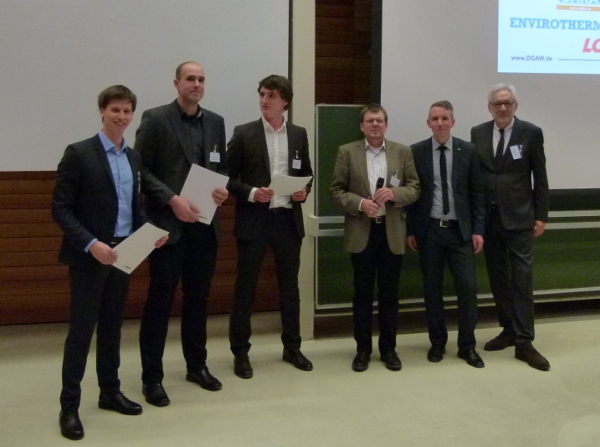
5th Scientific Congress "Waste and Resource Management" 2015, March 18-19, 2015 in Innsbruck
The 5th Scientific Congress on Waste and Resource Management took place on March 19 and 20, 2015. The German Association for Waste Management (DGAW) organized the congress in Austria for the first time. This year's host was Prof. Dr.-Ing. Anke Bockreis at the University of Innsbruck. Once again, the two-day event proved to be a much appreciated opportunity for exchange - many participants attended the event, at which current research and project work is presented, for the second time. In addition to the thematic lectures and presentations, the main focus is on contact and exchange.
Numerous sponsors made it possible to award prizes and scholarships to support young scientists from universities, colleges and university-related institutions. This year, Pawel Jan Baran (RWTH Aachen), Irene Schneider (University of Innsbruck) and Anna Jank (University of Innsbruck) received funding. The grant will enable Mr. Baran, who is researching the emission behaviour of nanoparticles during waste incineration, to purchase an additional sampling probe.
Thanks to this financial support, Ms. Schneider will be able to carry out further laboratory investigations into the storage and recycling (energetic and material) of kitchen and canteen waste. Ms. Jank, who is investigating the effects of non-separated impurities in processed biowaste in her work, will use the funding to adapt a flotation device.
The prize for the best poster, worth 500 euros, went to Peter Krämer from Münster University of Applied Sciences, whose work deals with the determination of fuel-relevant parameters in real time using near-infrared technology. Awards in the poster category also went to Maximilian Ueberschaar (TU Berlin) for his work on "Resource efficiency by means of alloy determination on the example of rare earth elements" and Axel Zentner (University of Dresden) for his work on "Silent resources: green waste from urban and traffic areas - potentials, collection, utilization".
The prize of 1,000 euros for the best presentation this year went to Münster University of Applied Sciences. The jury, consisting of Prof. Dr.-Ing. Anke Bockreis, Prof. Dr.-Ing. Mario Mocker, Dr. Matthias Franke and Prof. Dr.-Ing. Susanne Hartard, awarded the "Waste and Resource Management" science prize in the lecture category to Sebastian Bartscher, who analyzed the flow and particle separation of a zigzag classifier in experiments and 3D simulations. The modelling of the separation processes allows predictions to be made about the effectiveness of technical optimization measures. Tobias Gehrke from the University of Duisburg-Essen received an award for his presentation "Biological methane degradation in liquid filter media to increase the spatial performance of landfill gas treatment plants". Hanno Buchner (Vienna University of Technology) also received an award for his presentation on dynamic modeling of national aluminum flows to forecast future scrap quantities.
Auch im nächsten Jahr wird der Wissenschaftskongress „Abfall- und Ressourcenwirtschaft“ erneut jungen Wissenschaftlern die Möglichkeit geben, ihre aktuellen Forschungs- und Promotionsarbeiten im Rahmen des zweitägigen Kongresses dem Fachpublikum zu präsentieren.
Vorträge des Kongresses
Teil 1 Thermische Verfahren
- Verwendung von Altkunststoffen im Hochofen und deren Einfluss auf umweltrelevante Emissionen
Verena Trinkel, TU Wien
- Untersuchung des Emissionsverhaltens von Nanopartikeln bei der Abfallverbrennung
Pawel Jan Baran, RWTH Aachen
- Die Verbrennung von Abfällen als Aufbereitungsschritt zur Rückgewinnung von Metallen
Verena Enzner, TU Hamburg-Harburg
- Klärschlammkarbonisierung – ist dezentrales Phosphorrecycling möglich?
Kevin Friedrich, FH Bingen
Teil 2 Recycling
- Development of recycling process of neodymium based magnet
Mikael Méry, Fraunhofer UMSICHT / Tu Belfort-Montbéliard
- Verwertungswege für Altbatterien vor dem Hintergrund neuer Batteriesysteme – Untersuchung zur thermischen Vorbehandlung von Altbatterien
Paul Mählitz, TU Berlin
- Experimentelle und numerische Untersuchung eines Zick-Zack-Sichters
Sebastian Bartscher, FH Münster
Teil 3 Biologische Prozesse I
- Produktion biobasierter Produkte und Kraftstoffe auf Basis biologischer Siedlungsabfälle mittels verfahrenstechnischer Erweiterung einer Kompostieranlage
Jan Kannengießer, TU Darmstadt
- Potentiale für Biogasspeicherung und flexiblen Betrieb von Biogasanlagen im Mikrogasnetzverbund
Olga Panic, Universität Stuttgart
- Optimierte Erfassung und Lagerung von Speiseresten aus Kantinen und Gastronomiebetrieben
Irene Schneider, Universität Innsbruck
Teil 4 Biologische Prozesse II
- Praxisorientierte Überführung einer biologischen Wasserstoffproduktion vom Labormaßstab in den Pilotmaßstab
Jens Schoth, Universität Duisburg-Essen
- Anaerobe Behandlung von Biokunststoffen
Veit Grundmann, TU Dresden
- P-Recycling aus organischen Abfällen und Reststoffen – Stand, Potenziale und Perspektiven in Mecklenburg-Vorpommern
Jennifer Grünes, Universität Rostock
Teil 5 Deponien
- Konsequenzen der Nitrit-Elimination mittels Wasserstoffperoxid in Prozessabwässern der Edelstahlverarbeitung für die Cr(VI)-Freisetzung aus dem deponierten Hydroxidschlamm
Felix Brück, TH Mittelhessen
- Biologischer Methanabbau in flüssigen Filtermedien zur Steigerung der Raumleistung von Deponiegasbehandlungsanlagen
Tobias Gehrke, Universität Duisburg-Essen
- Prozesscharakterisierung im Belebtschlammverfahren einer Labor-Sickerwasseranlage zur Optimierung der Stickstoffeliminierung für eine betriebliche Großanlage
Andres Lucht, FH Köln
Teil 6 Stoffströme
- Senken als integrativer Bestandteil der Ressourcenwirtschaft
Dr. Ulrich Kral, TU Wien
- Optimierung der Erstbehandlung von Elektro- und Elektronikaltgeräten mittels Bilanzierung als Bewertungs- und Steuerungsinstrument
Julia Geiping, FH Münster
- Dynamische Modellierung nationaler Aluminiumflüsse zur Prognose zukünftiger Schrottmengen
Hanno Buchner, TU Wien

